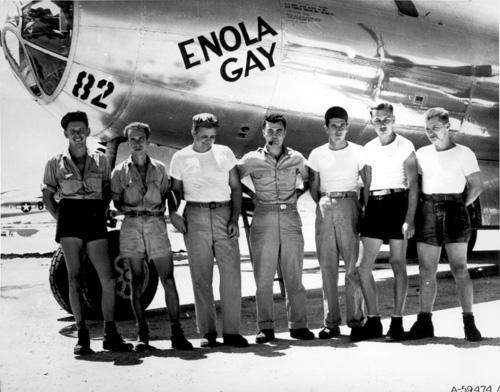WWII bomber pilot stands up for atomic bomb mission until death

In this undated handout picture from the U.S. Army Air Force, the ground crew of the Enola Gay B-29 bomber which bombed Hiroshima, Japan on Aug. 6, 1945 with the “Little Boy” atomic bomb, stands with pilot Col. Paul W. Tibbets, center, in the Marianas Is Erica Magda
November 2, 2007
COLUMBUS, Ohio – Paul Tibbets, who etched his mother’s name – Enola Gay – into history on the nose of the B-29 bomber he flew to drop the atomic bomb over Hiroshima, died Thursday after six decades of steadfastly defending the mission. He was 92.
Throughout his life, Tibbets seemed more troubled by other people’s objections to the bomb than by having led the crew that killed tens of thousands of Japanese in a single stroke. The attack marked the beginning of the end of World War II.
Tibbets grew tired of criticism for delivering the first nuclear weapon used in wartime, telling family and friends that he wanted no funeral service or headstone because he feared a burial site would only give detractors a place to protest.
And he insisted he slept just fine, believing with certainty that using the bombs on Hiroshima and Nagasaki saved more lives than they erased because they eliminated the need for a drawn-out invasion of Japan.
“He said, ‘What they needed was someone who could do this and not flinch – and that was me,'” said journalist Bob Greene, who wrote the Tibbets biography, “Duty: A Father, His Son, and the Man Who Won the War.”
Get The Daily Illini in your inbox!
Tibbets died at his Columbus home after a two-month decline caused by a variety of health problems, said Gerry Newhouse, a longtime friend.
“I’m not proud that I killed 80,000 people, but I’m proud that I was able to start with nothing, plan it and have it work as perfectly as it did,” he said in a 1975 interview.
“You’ve got to take stock and assess the situation at that time. We were at war … You use anything at your disposal.”
He added: “I sleep clearly every night.”
Filmmaker Ken Burns said Tibbets’ life “helps to take this incredible, gigantic event and personalize it. This is a real human being who changed the course of the world inexorably on that August morning.”
Paul Warfield Tibbets Jr. was born Feb. 23, 1915, in Quincy, Ill., and spent most of his boyhood in Miami. He was a student at the University of Cincinnati’s medical school when he decided to withdraw in 1937 to enlist in the Army Air Corps.
“I knew when I got the assignment it was going to be an emotional thing,” Tibbets told The Columbus Dispatch for a story on the 60th anniversary of the bombing. “We had feelings, but we had to put them in the background. We knew it was going to kill people right and left. But my one driving interest was to do the best job I could so that we could end the killing as quickly as possible.”
Tibbets, a 30-year-old colonel at the time, and his crew of 13 dropped the five-ton “Little Boy” bomb over Hiroshima the morning of Aug. 6, 1945. The blast killed or injured at least 140,000.
Associated Press writers James Hannah and Jon Belmont contributed to this report






